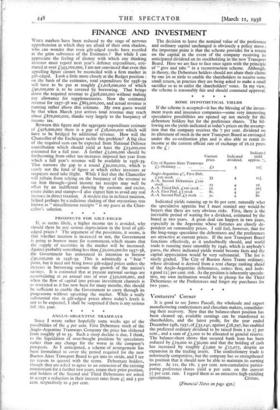FINANCE AND INVESTMENT
WHEN markets have been reduced to the stage of nervous apprehension at which they are afraid of their own shadow, who can wonder that even gilt-edged stocks have recoiled at the grim substance of the Estimates ? But while I can appreciate the feeling of dismay with which any thinking investor must regard next year's defence expenditure, esti- mated at over £343,000,000, I am not convinced that even this appalling figure cannot be reconciled with a firm market in gilt-edged. Look a little more closely at the Budget position : on the basis of the estimates, total expenditure for 1938-39 will have to be put at roughly £1,o18,00o,000 of which £9o,000,000 is to be covered by borrowing. That brings down the required revenue to £928,000,000 without making any allowance for supplementaries. Now the estimated revenue for 1937-38 was £863p0o,000, and actual revenue is running rather above this estimate. My own guess would be that when March 31st arrives total revenue may reach about £870,000,000, thanks very largely to the buoyancy of income tax.
Between this figure and the aggregate expenditure estimate of £928,000,000 there is a gap of £58,000,000 which will have to be bridged by additional revenue. How will the Chancellor of the Exchequer tackle this problem? A big slice of the required sum can be expected from National Defence contribution which should yield at least the £23,000,000 estimated for a full year. A further £5,000,000 should be forthcoming from other tax-increases imposed last year from which a full year's revenue will be available in 1938-39. That narrows the gap to a round £30,000,000, which is surely not the kind of figure at which either investors or taxpayers need take fright. While I feel that the Chancellor will refrain from relying on the buoyancy of the revenue to see him through—good income tax receipts may well be offset by an indifferent showing by customs and excise, estate duties and stamps—I also expect him to avoid any real increase in direct taxation. A modest rise in indirect taxation, helped perhaps by a judicious shaking of that mysterious tree known as " miscellaneous receipts " is my guess at the Chan- cellor's solution.










































 Previous page
Previous page